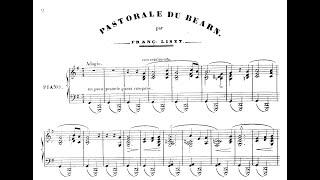
Liszt – Faribolo Pastour et la Chanson du Béarn, S236 (Csabay)
Комментарии:

Whimsy
Ответить
I think I could guess who your favorite composer is...
Also, where do you get these scans? Do you do them yourself? They're always very high quality!

These have been some of my favourite whimsy, caprice like pieces since very long...😁
Ответить
Could you please the following Liszt pieces next?
1. Marche Funebre, S.226a &
2. Romance Oubliee S.527

Thank you for not leaving out Chanson du Bearn!
Ответить
Franç Liszt
Ответить
Franz came to Béarn (Pau) and to the Basque country (Bayonne) in october 1844, invited by Caroline de Saint-Cricq.
Ответить
yay i've finally entered the lisztian circlejerk
Ответить
Wow!!
Ответить
SÈRENO AL CÒ DE GLAS per Jacques Jasmin de Françouneto (1840)
Faribolo pastouro,
Serèno al cò de glas,
Oh! digo, digo couro
Entendren tinda l’houro
Oun t’amistouzaras.
Toutjour fariboulejes,
Et quand parpailloulejes
La foulo que mestrejes,
Sur toun cami set mèt
Et te siet.
Mais rés d’acos, maynâdo,
Al bounhur pot mena;
Qu’és acòs d’estre aymado,
Quand on sat pas ayma?
SIREN WITH A HEART OF GLASS by Jacques Jasmin from Françouneto (1840)
O frivolous shepherd maid,
Siren with a heart of ice,
Oh! tell us, tell us when
we can expect the time
when you’ll finally be subdued.
Always fluttering and flirting,
And when you hover over
the crowd that you control,
upon your path they’ll fall
at your feet.
But nothing comes of this, young maid,
To happiness it never leads;
What is it to be loved like this
If you can never return that love?
LA HAÜT, SUS LAS MOUNTAGNES per Ciprian Desporrins
La haüt, sus las mountagnes, ú pastou malurous,
Ségut aú pè d'û haü, négat dé plous,
Sounyabe au cambiamen dé sas amous.
Cô leüyé, cô boulatyé, disé l'infourtunat,
La tendresse et l'amou qui t'ey pourtat, Soun aco lous rebuts qui èy méritat?
Despuch qui tu fréquentes la yen dé counditiou,
Qu'as près û tà haüt bôl, qué ma maysou
N'ey prou haüte entà tu d'û cabirou.
Tas oülhes dab las mies nou's dégnen plus mescla;
Touns superbès moutous, despuch ençà,
Nou's approchen des mès, qu'ent aús tuma.
Dé richesses mé passi, d'aúnous, dé qualitat;
You nou soy qu'û pastou; més noun y a nad
Qué n'eüs surpassi touts en amistat.
Encouère qué sy praübé, dens moun petit estat,
Qu'aymi mey moun berrét tout espelat, Qué nou pas lou plus bèt chapeu bourdat.
Las richesses de moundé nou hèn qué da turmén;
Et lou plus bèt seignou, dab soun aryén,
Nou baü pas lou pastou qui biü counten.
Adiù, cô dé tigresse, pastoure chens amou,
Cambia, bé pots cambia dé serbitou,
Yamey nou'n trouberas û tau coum you.
HIGH UP IN THE MOUNTAINS by
Cyprian Despourrins.
High up on the mountains, an unhappy shepherd.
Sitting at the foot of a beech, drowned in tears, Was thinking of the change in his love.
Light-hearted, fickle-hearted, said the unfortunate man, The tenderness and love that I bore you, Is that how I earned your rejects?
Since you've been frequenting the gentry, you've flown so high that my house is no longer one storey high enough for you.
Your sheep no longer mingle with mine;
Your superb sheep, since that time
Approach mine only to strike them [with their horns].
I do without riches, honour and quality;
I am only a shepherd, but there is none
That I do not surpass in friendship.
Even though I am poor, in my small state
I prefer my peeled beret
Than the finest hat with stripes.
The riches of the world only give torment;
And the most beautiful lord, with his money, Is not worth the shepherd who lives contentedly.
Farewell, tigress heart, shepherdess without love,
Change, you may well change your servant,
You'll never find one like me.

![This sniper is so deadly — he hits targets from 60 miles away without mercy [MOVIE RECAP] This sniper is so deadly — he hits targets from 60 miles away without mercy [MOVIE RECAP]](https://ruvideo.cc/img/upload/UTF1VTJPMklJMUs.jpg)
























